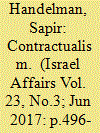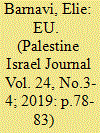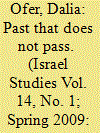| Srl | Item |
| 1 |
ID:
153234


|
|
|
|
|
| Summary/Abstract |
How do we create an effective change in situations of intractable conflict where ordinary people are at the centre of the struggle? Distinguishing between top-down contractualism and bottom-up contractualism, this article presents the South African peace process of the 1990s as an example of top-down contractualism. In contrast, it raises the question as to whether bottom-up peace-making contractualism can emerge in the Israeli–Palestinian case.
|
|
|
|
|
|
|
|
|
|
|
|
|
|
|
|
| 2 |
ID:
170948


|
|
|
| 3 |
ID:
086175


|
|
|
|
|
| Publication |
2009.
|
| Summary/Abstract |
The article raises issues that relate to the centrality of the Holocaust in the lives and imagination of many Israelis, and as a pivotal event that shapes their Jewish-Israeli identity. It examines the positions held by Israelis on the meaning of the Holocaust and the shaping of its memory, and asks whether the presence of the Holocaust in our lives represents an honest, unwavering effort to understand the Holocaust and its place in our world as human beings, Jews, and Israelis, or is a result of manipulating forces that use and abuse the memory of the Holocaust to advance unrelated political or social causes. The article presents a profusion of voices in Holocaust discourse and asks whether these are complementary or conflicting messages. It discusses the groups for whom the Holocaust was a personal experience, their offspring, who experienced the Holocaust as a family memory, and others whose memory of the Holocaust was shaped by survivors' testimonies, social processes, and the internalization of cultural messages. It focuses on the contribution of these groups in Holocaust research and artistic representation centering on literature, film, and music.
|
|
|
|
|
|
|
|
|
|
|
|
|
|
|
|